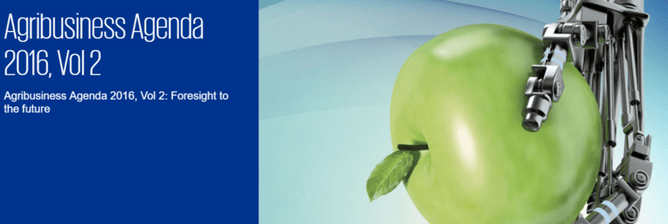Agriculture is an industry shaped by tradition, technique and unpredictable tendencies. It is mirrored off the basic human need - people need to eat. A fact which is a reliable reality for many suppliers who provide the external sources of which we all survive. Meaning that in a world which is constantly evolving and changing at a rapid pace, agriculture is still a booming industry. However, modern times has stretched original agribusinesses onto a much wider scale, using much smarter techniques.
The KPMG 2016 agribusiness agenda Volume 2 was published last week and focuses its approach on foreseeing the future. Currently the world is in an extremely adaptive form, making all of us highly conscious of the everyday choices we make. Agricultural businesses are no different. We are all needing to think smarter and allow technological changes to help us find better, more effective solutions to the problems agribusinesses constantly face. Although this can be daunting, as we live in uncertain times, it is an attitude which is essential for success.
Today we are living in a world which is pushing boundaries both in a metaphorical and physical capacity. The need to constantly progress is a mentality installed in us all. Here we can see a demand which has made for a new era of agribusinesses. Forcing us to ask the questions which speak the honest truths of global communities today. Do we sacrifice what we have always been doing in return for a more personalised and performance based production line? Or do we merge what we know will always be needed with what must be changed resulting in an overall more prosperous industry?
We are in a time where people are constantly moulding themselves in order to deal with the range of global issues we find ourselves faced with today. Whether that is being financially smarter, more environmentally friendly or being long-term orientated. However, to prep ourselves for major change in agriculture we must be well informed with the many technical shifts that might occur. Especially with the potential found within physical, digital and biological technologies. This can allow us to not only find solutions for existing problems but to become industry leaders embracing future challenges, to fix the gap between producer and consumer.
The power of the consumer and their increasingly personal and individualised demands are forcing us to think bigger about the potential of modified agriculture approaches. Our original ideas of market ideals may be challenged and disruptions are likely to occur. Our notion of reality and the future of agriculture must be viewed through a wide lens combining both practicality, performance and outcome.
2016 has been a year full of change and has pushed us to approach the world a little differently. You can find the KPMG Agribusiness Agenda 2016, Volume 2 here. Have a look through and let us know your thoughts.
It is clear that a challenging and inquisitive vision is needed to be had by us all, to understand what successful agriculture could look like in upcoming times. We believe we are about to enter into a new and exciting time within agriculture and look forward to what may happen next.
Georgie Cox is coming to the end of her studies at University in Auckland, where she is completing a Communications degree, majoring in Advertising. Georgie comes from a sheep and beef background in the Wairarapa.




